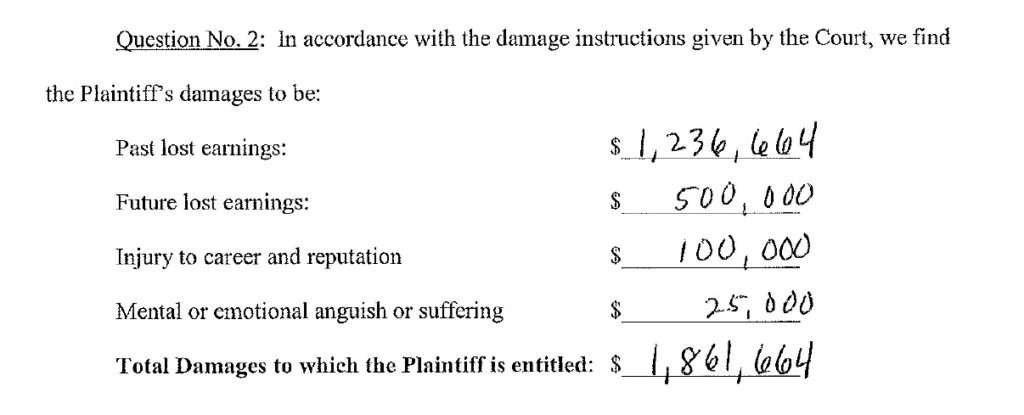Bad faith by a hospital and committee members when imposing discipline on a physician under medical staff bylaws resulted in a loss of Healthcare Quality Improvement Act (HCQIA) protections and in a $1.86 million verdict against the hospital and some committee members.
The plaintiff, an obstetrician/gynecologist proceeding pro se (without an an attorney), alleged that Gila Regional Medical Center, various Gila Regional Board Members (including Don White, the Chairman of the Board of Trustees), several members of the Medical Executive Committee, and members of the Peer Review Committee violated his civil rights and his due process rights.
Hospital Discipline Case History
The obstetrician signed a contract to provide services at Gila Regional Medical Center in exchange for a guaranteed income of $22,500/month. In this contract, he agreed to be bound by the hospital bylaws. Article 14 of the hospital bylaws contained an “immunity from liability” provision stating in pertinent part:
- 14.2 That any act, communication, report, recommendation or disclosure, with respect to any such practitioner, performed or made in good faith and without malice and at the request of an authorized representative of this or any other health care facility, for the purpose of achieving and maintaining quality patient care in this or any other health care facility, shall be privileged.
- 14.3 That such privilege shall extend to members of the hospital’s Medical Staff and of its Board of Trustees, its CEO and representatives, and to third parties who may be authorized to receive, release or act upon the same.
- 14.4 That there shall, to the fullest extent permitted by law, be absolute immunity from civil liability arising from any such act, communication, report, recommendation or disclosure, even where the information involved would otherwise be deemed privileged.
- 14.5 That such immunity shall apply to all acts, communications, reports, recommendations or disclosures performed or made in connection with this or any other health care institutions activities related, but not limited, to:
- 14.5-3 corrective action, including summary suspension, [and]
- 14.5-4 hearings and appellate reviews[.]
After being granted privileges at Gila Regional Medical Center, the physician received a summary suspension of his privileges and was notified that the Gila Regional’s Medical Executive Committee and Peer Review Committee were investigating two unspecified diagnostic laparoscopic procedures the physician had recently performed. In violation of its own bylaws, Gila Regional failed to provide the physician with a basis for the investigation, failed to show how the physician’s actions could have resulted in imminent danger to a patient, and failed to give the physician an opportunity to respond to the accusations against him.
Hospital Peer Review Action
In the Peer Review Committee proceedings, Gila Regional allowed the PRC Chairman, Dr. Jean Remillard, to serve as an accuser against the obstetrician, as a advocate in prosecuting claims against the obstetrician, as an unsworn expert witness against the obstetrician, and as a voting member of the Committee that sanctioned the obstetrician. The hospital never provided the obstetrician with names of anyone accusing him of substandard practice and also considered evidence against the obstetrician which the obstetrician was never allowed to dispute. In addition, the members of the PRC investigated more than 30 additional records of procedures performed by the obstetrician without notifying the obstetrician and without obtaining permission to do so – even though the care in those cases was never in dispute.
Dr. Jean Remillard wrote to the state medical board to inform them of the obstetrician’s summary suspension even though, by the hospital’s own bylaws, the suspension lasted only 14 days and such a report was only required for suspensions lasting more than 30 days.
Dr. Jean Remillard also allegedly filed a report with the National Practitioner Databank making multiple false statements including that
- an outside peer review of selected cases contributed to the Board’s decision to suspend the obstetrician’s privileges
- the obstetrician’s skills and medical care were substandard or inadequate and constituted an immediate threat to health or safety when such findings were never made
After a review of the Peer Review Committee and recommendations, the Gila Regional Medical Executive Committee expressed concerns over poor documentation, need for in-depth continuous monitoring, and need for further education. The MEC made no findings that the obstetrician had placed patients in imminent danger.
Despite this, the MEC recommended multiple harsh punishments to the Gila Regional Board, including a requirement that the obstetrician’s privileges to perform gynecological surgery would be suspended until he received additional education regarding indications for and techniques of all gynecological surgery and until the Board received confirmation from an educator that the obstetrician was competent to practice in a small town.
Dr. Gregory Koury served on the Gila Regional Peer Review Committee, the Gila Regional Medical Executive Committee and was a member of the Gila Regional Board of Trustees. Dr. Koury’s was the deciding vote in the Board’s decision to adopt the MEC’s recommendations.
After the Board’s decision, the obstetrician sued Gila Regional Medical Center and several members of its medical staff for violation of his civil rights, defamation/damage to his reputation, and intentional infliction of emotional distress. The defendants sought dismissal of the case based upon an alleged expiration of the statute of limitations, based upon qualified immunity since physicians have no property interest in contracts or their medical privileges, and based on immunity protections under the Healthcare Quality Improvement Act.
As a result of Gila Regional Medical Center’s actions, the obstetrician was unable to obtain employment as a physician for more than four years.
Defendants in the case filed a motion to dismiss portions of the plaintiff’s lawsuit based on the immunity waiver contained in the hospital bylaws – to which the physician agreed.
Trial Court’s Ruling on Hospital and Committee Member HCQIA Immunity and Bad Faith
Among defenses that the hospital and committee members raised was that when disciplining a physician, they are immune from liability by the terms of the HCQIA. With regard to the defendant’s assertions of qualified immunity, the court noted that a physician has a protected property interest in a contract for services that can only be terminated for cause and that a physician has a protected liberty interest in his professional reputation – citing multiple Tenth Circuit cases holding the same. “Qualified immunity does not apply if a defendant violated a plaintiff’s constitutional right and if the right was established to the point that a reasonable official would understand that his actions violate that right.”
The court also noted that while the agreement that the physician signed provided absolute immunity to the hospital and its agents for taking corrective actions against physicians, that absolute immunity applied only to “those individuals who act in good faith, without malice, and with authority to act.” While the court dismissed several defendants who acted in good faith, the court refused to dismiss defendants who ignored the physician’s due process rights and/or committed extreme and outrageous acts. The court noted many of the bad faith outrageous actions taken by defendants including the following:
- Summarily suspending the doctor’s privileges without just cause
- Repeatedly disregarding requirements in the hospital bylaws
- Refusing to allow the doctor to refute accusations against him
- Allowing one MEC member to prosecute the case against the physician, serve as a witness, and also to serve on the panel deciding the doctor’s fate
- Misrepresenting facts and omitting favorable facts in the summary of the hearing committee presented to the MEC
- improperly allowing a witness to testify at the Board hearing and refusing to allow the doctor to cross-examine the witness
- making demonstrably false statements in reports to the state medical board and to the NPDB
- issuing harsh sanctions against the physician without any finding that the physician violated the standard of care
In refusing to dismiss the hospital, Jean Remillard, M.D.; Gregory Koury, M.D., or Don White from the plaintiff’s suit, the court held that “The Plaintiff has a clearly-established constitutionally-protected property interest in the contract and medical privileges that Gila Regional granted to him, and he has established that Dr. Remillard, Dr. Koury, and Don White actively participated in violating his right to due process as a matter of law.” In addition, the court ruled that Dr. Jean Remillard’s actions were so outrageous that a separate claim for intentional infliction of emotional distress was justified. See court opinion on Defendants’ Motion for Summary Judgment here.
In a separate ruling, the judge commended the physician for being able to maintain his lawsuit to the point that it was nearing trial, but stated that “when a pro-se Plaintiff who is untrained in the law goes to trial against two large, very experienced law firms and four experienced defense lawyers, it is like showing up at a gunfight with a knife.” The court recommended that the physician obtain counsel for the remainder of the suit.
Ultimately the physician did find counsel to represent him, took the case to trial, and was awarded $1,861,664 by a jury.

As the prevailing party in a civil rights lawsuit, pursuant to 42 U.S. Code §1988 (Proceedings in vindication of civil rights), the plaintiff also petitioned for an award of $117,000 in attorneys’ fees.
Takeaways
- The Healthcare Quality Improvement Act (HCQIA) protects hospital committees and committee members when disciplining a physician, but only if those entities meet requirements within the law. Committees and their members must make reasonable efforts to obtain facts and provide fair procedures to the involved physician, must provide due process in a hearing before a neutral arbiter and must act in a reasonable belief that the review action was warranted to further quality health care. If a defendant physician can show otherwise, the hospital, committee, and committee members may be subject to civil judgments
- Early involvement of legal counsel is important when defending hospital actions involving suspension of privileges, issues involving a physician’s competency, or questions about a physician’s professionalism. In all such cases, loss or restriction of privileges may result in state licensure actions and a report to the National Practitioner Databank.
- Hospital committee members who fail to act reasonably or who fail to act in good faith in actions involving physician discipline may be subject to personal lawsuits and substantial legal judgments. Such judgments are not covered by medical malpractice insurance. Actions taken in bad faith may not be covered by Directors and Officers insurance, leaving the committee members personally responsible for paying any judgment.
Cited case: Chinonyerem Osuagwu v. Gila Regional Medical Center; Jean Remillard, M.D.; Gregory Koury, M.D.; Michael Sergeant, M.D.; Mark Donnell, M.D.; Ronald Deyhle, M.D.; Don White, 938 F.Supp.2d 1180 (2013)
To see additional articles about board actions and due process, go to the Medical Boards section of this blog.
If you need help dealing with a state medical board or a hospital disciplinary committee, give me a call. I’d be happy to try to help.
